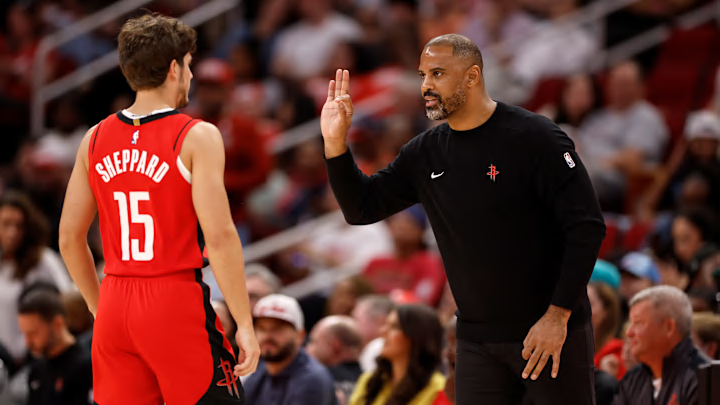As the Houston Rockets prepare for a monumental offseason, head coach Ime Udoka needs to clarify to general manager Rafael Stone how he views Reed Sheppard. Stone selected Sheppard at No. 3 overall in the 2024 NBA Draft, but Udoka offered the former Kentucky Wildcas star limited minutes during his rookie season.
As such, as the Rockets weigh their options on the trade front, Stone and Udoka will need to get on the same page about how Sheppard factors into Houston's future.
Sheppard was one of the most intriguing prospects to emerge from a 2024 NBA Draft class that's shaping up to be one of the most under-appreciated in recent memory. It lacked a Cooper Flagg at the top of the board, but featured a deep selection of quality prospects.
A strong case can be made that Sheppard has the tools to one day emerge as not only worthy of the No. 3 pick, but the best player in his class.
Sheppard is an undersized guard, but he makes up for that with a 43.0" max vertical leap and a jump shot that looked all-time elite in college. He knocked down 52.1 percent of his 4.4 three-point field goal attempts per game during his lone year at Kentucky, all the while leading the SEC in steals per contest and flashing the potential to become a starting-caliber playmaker.
Sheppard showed flashes of brilliance during his rookie season, but with incessant trade talk, Udoka must commit to a future either with or without him for Stone to make an informed decision about the young guard's value to the Rockets.
Does Reed Sheppard still factor into the Rockets' future?
Sheppard, 20, finished the 2024-25 regular season averaging 4.4 points, 1.5 rebounds, 1.4 assists, 0.7 steals, 0.3 blocks, and 0.9 three-point field goals made in just 12.6 minutes per game. He struggled to develop a consistent rhythm as a shooter, ultimately converting at a clip of .351/.338/.813.
Sheppard's upside remains evident, however, when translating his averages to 12.6 points, 4.3 rebounds, 4.1 assists, 1.9 steals, 0.9 blocks, and 2.6 three-point field goals made per 36 minutes.
Despite his intriguing production, Udoka gave Sheppard upward of 20 minutes in just five outings as a rookie. Nevertheless, the 20-year-old delivered when his number was called, averaging 16.0 points, 3.8 rebounds, 3.4 assists, 1.6 steals, 0.8 blocks, and 3.4 three-point field goals made per game during those appearances.
That includes a 25-point and five-assist performance against the Oklahoma City Thunder, and a 20-point showing at the LA Clippers.
A five-game sample size isn't enough to base a franchise-altering decision on, but it's hard to ignore the fact that Sheppard stepped up almost every time his number was actually called. The hurdle for Stone will be figuring out how much more faith Udoka will place in Sheppard in 2025-26 and beyond.
Udoka shouldn't be forced to play anyone, of course, but he should make it clear to the front office if Sheppard actually figures into his plans for turning a 52-win team into a true contender in 2025-26.
If Udoka believes that Sheppard has the tools to contribute in 2025-26, then it would behoove Houston to invest in his potential. Limitations can be placed upon that statement, as a Giannis Antetokounmpo trade is the clearest path to contending and Milwaukee may prioritize young talent in the return, but Sheppard is too promising to give up on without first confirming if the coaching staff still sees something special in him.
If Udoka isn't planning to utilize Sheppard in 2025-26, however, then Houston's most difficult decision will come down to whether or not Stone believes the 20-year-old's future is a hill worth fighting on.
